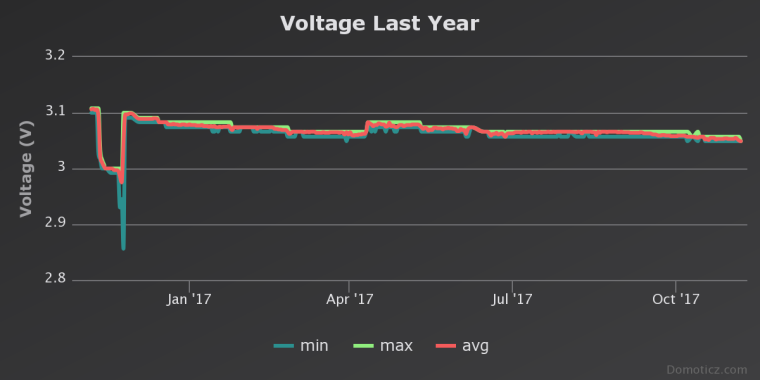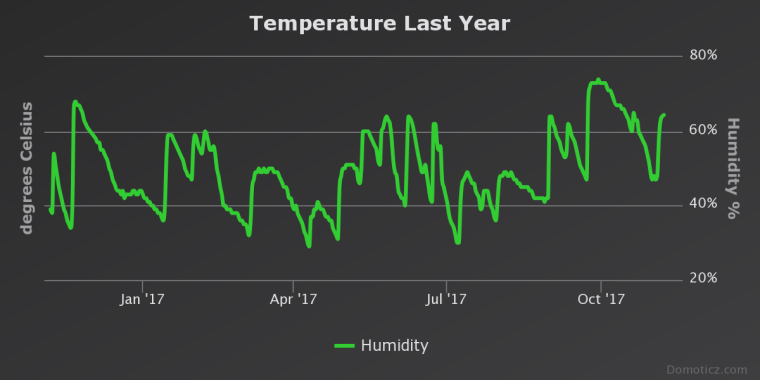Office plant monitoring
-
@mfalkvidd, @Nicklas-Starkel
similar problem here. I have a bare ATMega 328P, running @ 8 MHz internal oszillator. no LED, bod disabled, (if enabled, the ADC is running also during sleep, so this means additional power consumption), nothing else connected that could draw additional power.
I use mfalkvidd's sketch (BTW, thanks a lot for it !), but converted to mysensors 2.0. I see a voltage drop way higher than mfalkvidd, although I don't use a china clone ;-).
So it seems, that the higher power consumption may be due to mysensors V2 ? I cannot imagine a reason for that, because why should relatively low level functions like power save routines be different in 2.0 ?
Perhaps hek can comment ? -
Thanks for this great solution @mfalkvidd! It works great when my Arduino Pro Mini is connected to the computer, but not when I try to run it off a battery pack.
I have a Pro Mini 3.3v connected to a 0.8-3.3v step up from a battery pack (2xAA; 3v). And then I have connected the radio and sensor to VCC on the Pro Mini. When the Pro Mini is connected to my iMac, Domoticz receives everything as it should. However, when I disconnect it from the computer and connect the battery source, all LEDs light as they should, indicitating that they have power, but it won't connect to Domoticz over NRF24.
I have used a multimeter to check the voltage and if the radio receives enough power, and it does. All power/ground pins show around 3.3v. Any ideas to debug what's wrong?
@ronnyandre a multimeter is unfortunately not sensitive enough to display if there is enough power during the short bursts when the radio is active.
Most step-ups don't deliver power that is stable enough. You could try adding more/larger capacitors, but from what I have seen in the forum, people seldom get thing working reliably with a step-up. I have never tried using step-up myself, I use power directly from the batteries.
If you haven't checked already, see the troubleshooting chart at https://forum.mysensors.org/topic/666/debug-faq-and-how-ask-for-help/
-
-
@ronnyandre a multimeter is unfortunately not sensitive enough to display if there is enough power during the short bursts when the radio is active.
Most step-ups don't deliver power that is stable enough. You could try adding more/larger capacitors, but from what I have seen in the forum, people seldom get thing working reliably with a step-up. I have never tried using step-up myself, I use power directly from the batteries.
If you haven't checked already, see the troubleshooting chart at https://forum.mysensors.org/topic/666/debug-faq-and-how-ask-for-help/
@mfalkvidd Thanks for the quick answer! I also read on the page for battery powered sensors that the step up generates alot of noise that can interfere with the radio, and that a solution might be to add capacitators (which I already tried), but also powering the radio directly from batteries. I'll try that later today. Thanks! :smiley:
And thank you for the link to the troubleshooting. It's now bookmarked! :wink:
-
Just copy the relay code from https://www.mysensors.org/build/relay and add it your sketch and make necessary changes to adapt it: like setting child_id in presentation
-
It's a pity that at least one sketch for the analog reading of moisture sensor is not v2 compatible and made available on the main page ... i have no idea if making it v2 compatible would be a hard job...even if it's just a question of changing some library calls i'm afraid i don't have the skill for that...
-
My Bonsai tree humidity node celebrates 2 years on battery today!
During these two years, the gateway has received 146,528 updates on humidity level (and an additional 30,870 updates on voltage level).
The battery level has gone from 3.187V to 3.049, which means an average drop of 0,0058V per month. Assuming I let it go down to 2.34V (limit for 8MHz according to the datasheet) and that the voltage drop is linear, I should get (3.187-2.34)/0.0058 = 146 months = ~12 years. There are several error sources in this calculation, but it looks like battery life will be quite good.
Here are the voltage and humidity graphs for the last year.


As you can see, there was a problem in November. I was asked to verify the battery voltage reading by using a multimeter. When I opened the box to do that, I must have tripped something because the node got caught in some sort of loop, consuming battery. I restarted the node and the batteries recovered almost to the level they had before the problem occurred.
Last year's report: https://forum.mysensors.org/post/52232
-
My Bonsai tree humidity node celebrates 2 years on battery today!
During these two years, the gateway has received 146,528 updates on humidity level (and an additional 30,870 updates on voltage level).
The battery level has gone from 3.187V to 3.049, which means an average drop of 0,0058V per month. Assuming I let it go down to 2.34V (limit for 8MHz according to the datasheet) and that the voltage drop is linear, I should get (3.187-2.34)/0.0058 = 146 months = ~12 years. There are several error sources in this calculation, but it looks like battery life will be quite good.
Here are the voltage and humidity graphs for the last year.


As you can see, there was a problem in November. I was asked to verify the battery voltage reading by using a multimeter. When I opened the box to do that, I must have tripped something because the node got caught in some sort of loop, consuming battery. I restarted the node and the batteries recovered almost to the level they had before the problem occurred.
Last year's report: https://forum.mysensors.org/post/52232
-
@gohan no actually I don't. The voltage drop is normally a s-shaped curve that is very flat in the middle. That means I am experiencing a higher drop at the beginning. That's likely the reason that the prediction after 2 years is more than 10% longer battery life than the prediction after 1 year was.
-
Yes, it depends when the voltage starts to drop significantly, but unless you have tested another battery before it is hard to know in advance 😀
